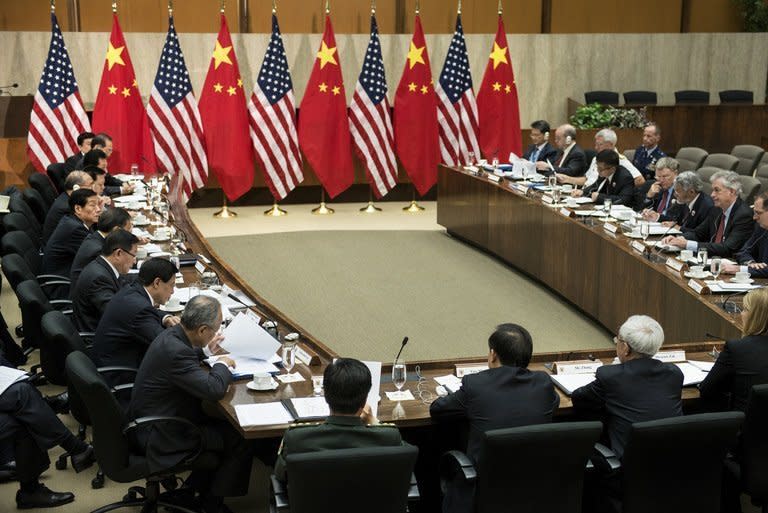US, China see progress on investment treaty
The United States and China said Thursday they had moved forward on a treaty that would ramp up investment as the world's two largest economies highlighted progress in often strained ties. Despite a feud over cyber-hacking, US officials said China had agreed for the first time to put on the table all areas -- not just those it selects -- in negotiations on a treaty that governs investment rules. Treasury Secretary Jacob Lew said in a statement that a bilateral investment treaty would "work to level the playing field for American workers and businesses by opening markets for fair competition." "The commitment made today stands to be a significant breakthrough and marks the first time China has agreed to negotiate a bilateral investment treaty, to include all sectors and stages of investment, with another country," he said. The United States and China first started talks on a treaty in 2008 and the two sides remained vague on the extent of progress, not giving any timeframe for the conclusion of negotiations. Chinese Commerce Minister Gao Hucheng spoke favorably of a treaty, saying that it would boost the future of investment that has already topped $90 billion between the two countries. A treaty holds incentives for both sides. The United States often complains of Chinese restrictions on foreign investors, although a US official said the Chinese side also spoke of developing a model free trade zone in Shanghai. China, in turn, has been alarmed by repeated US efforts to limit investment in sectors seen as critical to national security. Telecoms giant Huawei recently became the latest Chinese firm to lose hope over the US market after a congressional report charged that its equipment could be used for spying. A bilateral investment treaty would need approval by two-thirds of the US Senate, where many members are critical of China's activities in areas from copyright protection to its currency rate to human rights. For the second day in a row, the United States raised charges that China has waged a vast hacking campaign to steal US trade and government secrets, costing the economy billions of dollars through counterfeit products. "As major powers looking to forge a new model of relations, our countries have a responsibility to show restraint in our actions and abide by the rules meant to govern international affairs," Deputy Secretary of State William Burns told a session. "This means respecting the universality of human rights and addressing cyber-enabled theft of intellectual property," Burns said. Burns also called on China to "uphold the freedom of navigation" in the economically vital waterways of Asia, where US allies Japan and the Philippines as well as Vietnam accuse Beijing of aggressively exerting its claims. A US official said that Secretary of State John Kerry on Wednesday was "very forceful" on human rights concerns in China and raised specific cases. Burns later filled in for Kerry, who returned to Boston to see his hospitalized wife. Lew separately called on China to allow a rise in its currency, the yuan, which US manufacturers charge is kept artificially low to boost exports. But pressure has eased as the yuan has risen by more than 15 percent against the dollar in recent years, mostly due to China's inflation concerns. Despite the range of disputes, both sides have been eager to keep tensions from getting out of hand. In a sign of the importance he attaches to managing ties with the rising Asian power, President Barack Obama -- who generally meets only leaders from other nations -- received the Chinese delegates at the White House. Obama last month spent a weekend with newly installed President Xi Jinping at a resort in the California desert, hoping to develop a rapport with the man who will likely lead China for a decade in which its economy will surpass that of the United States. The United States and China -- which together pump out more than 40 percent of carbon blamed for the planet's warming temperatures -- also pledged to step up cooperation on climate change, a growing priority for both governments.





